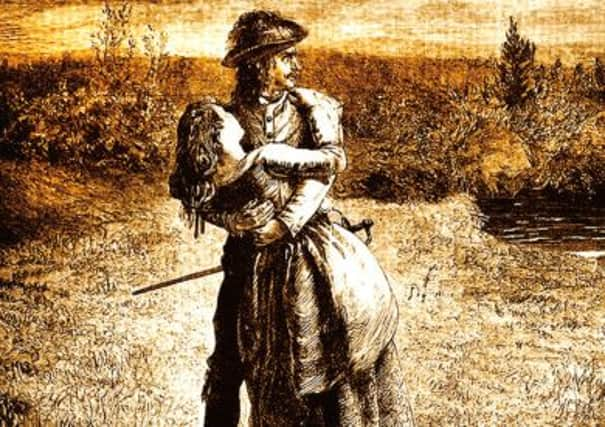Book review: Fair Helen by Andrew Greig


Fair Helen by Andrew Greig
Quercus £16.99
In 1802, Walter Scott made a sensational literary debut with his first collection of Border ballads, among them Fair Helen Of Kirkconnel, a simple tale of a woman fought over by two lovers who dies protecting one from the other. Scott noted that the story was well known, but there was some confusion about the detail of what really happened.
In Andrew Greig’s new novel, a witness to the event is here to clear that up: sickened by the sentimental ballad which emphasises the noble sacrifice but leaves out the machinations which led to it, he sets out to tell us the “real” story. Harry Langton saw the whole thing: Helen was his cousin, one of her lovers was his beloved friend and he himself was mired in those schemes which brought it to pass. And it is another Walter Scott – the late 16th century 1st Lord Scott of Buccleuch, famous reiver and a kinsman to the later writer – who emerges as the villain of the piece.
Advertisement
Hide AdLangton recounts the story decades afterwards; he has outlived his time and is lodging as a sort of living history exhibit at Hawthornden Castle (then, as now, a writers’ retreat). His kindly patron finds his tales of the semi-lawless Border raids quaintly romantic, from the viewpoint of a calmer, more regimented time.
But when young, Langton is a man rather ahead of his time, interested in new European ideas and attempting to translate the semi-heretical Epicurean philosophy of Lucretius, who rejected a spiritual origin for the world. Together, he and his old university friend Adam Fleming have a rare laugh mocking the superstitious nonsense of King James’ witch-hunting opus Daemonologie. So when Langton is drawn into the orbit of the sinister Scott of Buccleuch, who recruits him as a spy, it’s partly from a materialist desire to further his own ambitions, partly a fear of drawing too much attention to what could be deemed treasonous thoughts.
“How does one ever bring lasting peace to the Borderlands?” asks Langton’s master, testing him. “Abolish the Border,” is the answer: under James VI and I, the centuries of cross-border skirmishes will be firmly subdued as the region becomes, henceforth, merely the “Middle Shires”. Getting to that point is Scott’s goal and he’s prepared to use anyone to do it. And “Fair Helen”, the beautiful Borders maiden being offered up to suitors, along with Fleming, who loves her but is at odds with her family, are, like Langton, pawns in his game.
Greig is a poet as well as a novelist and takes a clear joy in creating a language for the book which abounds in Scots words and gorgeous descriptions: “the wintry chittering of pea-sticks in the Bonshaw garden, the blood-dark of haw berries among thorns shook in the wind, glister of burns as light drained from the haugh, the slow march of flat clouds over Tinnis Hill,” to take just one example. Vivid metaphors (“song and story inflated a man’s deeds like gas in the belly of a dead pig”) are to be found on almost every page.
But despite its title, the novel has a surprising lack of interest in what “Fair Helen” herself thought or wanted. “The ballad bears her name, yet what did anyone know of her other than that she was fair?” muses the narrator – but she doesn’t emerge much more clearly here either. He concludes that her “fairness” lay not just in her outward beauty but in something mysterious within, which hardly helps to round her out as a three-dimensional character. Her lover Adam Fleming, who the narrator himself loves, is also presented as little more than confused and besotted.
The problem is Langton himself: melancholy in his old age, suffused with guilt and nostalgia, he brings too much to bear on this incident, which appears to have been the only thing of significance to happen in his life. There’s too much of him darkly hinting at the important events to come. When they arrive, they can’t take the burden of all that foreshadowing.
Advertisement
Hide AdThe ballad is often described as a Scottish Romeo & Juliet, but Greig has another dramatic parallel in mind which, perhaps, it would spoil things to reveal. Yet while this makes for a cute scene as Langton passes on the story to a certain person looking for creative inspiration, it doesn’t add any depth to the tragedy and has so many loopholes that it seems redundant.
Perhaps the later Walter Scott had the right idea: Fair Helen works best in ballad form, as a poetic wallow in tragedy to induce a sentimental sniffle. Though this novel can barely be faulted for its rendering of the period, the story it tells is little more than that.
Twitter: @Pandrea100
Advertisement
Hide AdAndrew Greig is appearing at the Edinburgh International Book Festival on Saturday
Check out our all-new Edinburgh Festivals guide [http://www.edinburgh-festivals.com/], with listings for every show, alongside every Scotsman review, and an at-a-glance ticker of events in the next hour. It’s also mobile-friendly for when you’re out and about.
Sign up to our daily Festival Newsletter. Enter your details now to stay in the loop and enjoy exclusive ticket offers.